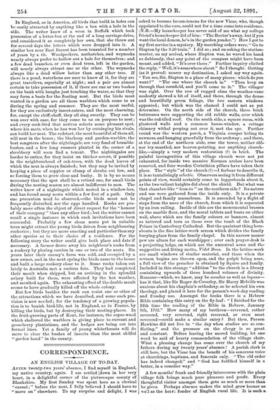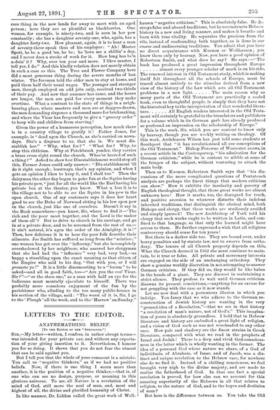CORRESPONDENCE.
AN ENGLISH VILLAGE OF TO-DAY.
AFTER twenty-two years' absence, I find myself in England, my native country, again. I am settled !,down in ber very heart, in a delightful corner of the picturesque county of Blankshire. My first Sunday was spent here as a clerical " casual ; " before the next, I fully believed I should have to " move on" elsewhere. To my surprise and delight, I was asked to become locum-tenens for the new Vicar, who, though appointed to the cure, could not for a time come into residence. (N.B.—My housekeeper has never said of me what my college friend's housekeeper did of him: " The Rector's away, but if you want the local demon, he's in the garden yonder.") How I got to my first service is a mystery. My marching orders were, " Go to Slapton by the 9.20 train." I did so ; and on asking the station- master, on my arrival, where Slapton was, he waved his hand. so dubiously, that any point of the compass might have been meant, and added, " It's over there." Farther inquiry elicited the reply, " Well, it's somewhere about." So I thought. Getting (as it proved) nearer my destination, I asked my way again- " You see, Sir, Slapton is a place of many pieces : which do you want?" " The one where the church is." " Then keep on through that cornfield, and you'll come to it." The villager was right. Over the row of rugged elms the weather-vane- modestly showed a bit of itself, and there, through the dense- and beautifully green foliage, the two eastern windows appeared ; but which was the chancel I could not as yet determine. On the north side of the church, three brick buttresses were supporting the old rubble walls, over which was the red-tiled roof. On the south side, a square room, with plastered walls and a common house-window, a cottage chimney withal peeping out over it, met the eye. Further- round was the western porch, a Virginia creeper hiding its newness, and hanging gracefully from the archway ; and there,. at the end of the northern aisle, rose the tower, neither old,- nor ivy-mantled, nor heaven-pointing, nor anything church- like,—simply a very modern restoration (P) in brick. The painful incongruities of this village church were not yet exhausted, for inside two massive Norman arches have been removed, and four wooden Corinthian pillars have taken their place. The " style" of the church (?)—I forbear to describe it,. it is so tantalisingly eclectic. Observers seeing it from different points of view, would certainly come to loggerheads about it, as the two valiant knights did about the shield. But what was that chamber-like " lean-to " on the southern side ? Its nature and use were gathered from the inside only. It is a private- chapel and family mausoleum. It is ascended by a flight of steps from the nave of the church, from which it is separated by an iron railing. Inside of this are the monumental brasses on the marble floor, and the mural tablets and busts on either wall, above which are the family colours or banners, almost. as tattered and torn as those over the tomb of the Black Prince in Canterbury Cathedral. But the quaintest thing here- abouts is the fine lattice-work screen which divides the family burying-place from the family chapel. In this narrow manor pew are altars for each worshipper ; over each prayer-desk is a projecting ledge, on which are the ancestral arms and the suggestive and fitting motto, Videt Deus. In the lattice-work are small windows of similar material, and these when the sermon begins are thrown open, and the pulpit being near,. a full view of the preacher is obtained by Squire and family_ Included in this strange " addition " to the church is a library containing upwards of three hundred volumes of divinity. Rumour—which, we know, may be mend= as well as loquax- has it that, like Sir Roger de Coverley, Sir Harry Melville was anxious about his chaplain's orthodoxy, so he selected his own theology, and placed it here for the parson's week-day reading and Sunday use. Amongst the books there is a Hebrew Bible containing this entry on the fly-leaf : " I finished for the fifth time the reading of the Bible in Hebrew, January 8th, 1702." How many of my brethren—reverend, rather reverend, very reverend, right reverend, or even most reverend—could make a similar entry ? But then, Parson Hawkins did not live in " the day when studies are so con- flicting," and the pressure on the clergy is so great and constant. Before leaving the sacred building, let one word be said of hearty commendation of the village choir.. What a pleasing change has come over the church of my fathers during my twenty years' absence ! A parish clerk is still here, but the Vicar has the benefit of his sonorous voice at churchings, baptisms, and funerals only. " The old order has indeed changed," and " God has fulfilled himself in a better, in a comelier way."
A few months' frank and friendly intercourse with the plain village folk brings much pure pleasure and profit. Every thoughtful visitor amongst them gets as much or more than he gives. Perhaps absence makes the mind grow keener as well as the hear:. fonder of English rural life. It is such a. rare thing in the new lands far away to meet with an aged person ; here they are as plentiful as blackberries. One woman, for example, is ninety-two, and is seen in her pew constantly ; she has a daughter seventy-one, who, again, has a daughter forty-two. How pleasant, again, it is to hear a man of seventy-three speak thus of his employer: " Ah ! Master Spott, he be a good 'un, he be; he 'lows me a shillin' a day, and I never does a stroke of work for it. How long has be'n a-doin' it ? Why, over ten year and more. I likes master, I tell yer, I do." And this kindly relation does not merely obtain in such a case as this. The Tree and Flower Company here did a most generous thing during the severe months of last winter. The foreman told the older men to stay at home, and paid them half their natal wages. The younger and stronger men, though employed on odd jobs only, received two-thirds of their pay. And now that summer has come, and the hours are longer, the men are paid for every moment they make overtime. What a contrast to the state of things in a neigh- bouring place, where masters and men are at daggers-drawn, the men demanding sixpence a thousand more for brickmaking, and where the Vicar has frequently to give a " grocery order " to keep wife and children from starving !
Given the power of a humorous perception, how much there is in a country village to gratify it ! Father Jones, for -example, is " dead agen the Church, as she's carried on nowa- days. She's a disgrace to uz, that she is. We must dis- stablish her." " Why, what for ? " " What for ? Why, to stop this rittleism. Why at Pa tchbrook yonder, they carries a brass cross right round the church. Whoe'er heered of such a thing ? " Asked to show how Disestablishment would stop all this, Farmer Jones could only answer : " Dis-stablishment 'ill do it right enough ; leastways, that's my opinion, and when I gets an opinion I likes to keep it, and I shall too." Then the -dairyman the other day began to poke fun at the Squire having his private pew, "just for all the world like the Earl having his private box at the theater, you know. What a loss it is to the village not to be able to see the Squire in his pew in the -open church. One of my customers says it does her heart good to see the Duke of Norwood sitting in his low open pew in the church, just like one of ourselves. Doesn't it say in the Book somewhere—you know, Sir, where to find it—' The rich and the poor meet together, and the Lord is the maker of them all'? But to drive to church in his carriage, and go in at a private door, and to be screened from the rest of us,— it ain't natural, it's agen the order of the Almighty, it is !" Then, how delicious it is to hear the poor folk describe their ailments. Joe Smith has suffered so long from the " sciatico ;" one woman has got over the " infloreny," but she is completely overshadowed by her neighbour, who assured her clergyman that she had had the " influence " very bad, very bad,—as happy a stumbling upon the exact meaning as that citizen of the Empire who said to his dog, " Out with you, or I will promote ye !" It is a little disconcerting to a " locum " to be asked—and all in good faith, too—" Are you the real Vicar, Sir ?"—" or the sham one," as a man with half an eye for the 'ludicrous must mentally ejaculate to himself. There was probably more conscious enjoyment of the fun by the parishioner who, alluding to the too many public-houses in his section of the village, said : " The worst of it is, Sir, I go to the' Plough 'all the week, and to the 'Harrow 'on Sunday."



































 Previous page
Previous page